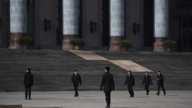【新唐人2014年01月01日讯】中共国家审计署12月30号宣布,中国地方政府的债务,今年6月底已经攀升到17万 9000亿元人民币。经济分析人士担心,在经济增长速度放慢的情况下,地方的债务迅速增长,可能导致坏账增加。而地方债务攀升会给中国经济带来什么影响,这些债务最后由谁买单?我们来听听专家的分析。
30号,大陆审计署在官网公布了长达13页的审计数据。根据审计署的报告,截至2013年6月底,各级政府负有偿还责任的债务20万7000亿,其中中央债务9万8000亿,地方债务10万 9000亿,如果包括有可能产生的债务,总体债务将有30万 3000亿,其中中央12万4000亿,地方17万9000亿。
美国南卡罗莱纳大学艾肯商学院教授谢田:“地方政府的债务在过去十几年中,慢慢的增长起来的,地方政府的债务上升的原因,是地方政府利用各种各样的融资平台,城建基金平台,用这些钱来筹集资金,投资建设房地产项目,基建项目,来带动GDP,现在看来已经失控了。”
地方债务增长在资金来源方面,主要源于债券与信托等方式,而银行贷款仍是主要的融资方式。截至2013年6月,地方债务在银行贷款的整体规模约有10万亿。而债券的发行也大幅增长,增长到了1万8400亿。其他融资方式如﹕BT(Build-Transfer,建设-移交)、信托等,增长了4万5000亿元。
谢田:“中央政府曾经派出很多工作组到各个省市去调查,但这个调查回来的数字,并没有被立即披露,这实际上是一个政策性问题,说中央政府 有多少承担的能力,愿意把这真正的数据披露多少,现在外界认为,估计可能都超过了30万亿,甚至更多。”
10月20号,中共审计署曾向国务院汇报了地方债务最新规模。对于刚刚出炉的数字,社会各界,包括外国金融机构都颇为期待,但是却迟迟没有公布。
11月30号,中共喉舌《新华网》发表文章宣称,地方债测算的两个主要部门,财政部和审计署,一直以来因为统计口径的不同,测算结果也存在差异,统计结果还没有确定,难以公布。
英国广播公司《BBC》中文网报导,北京在7月底开始债务审计,当地政府借款是关注的焦点。许多人担心中国债务问题,以及它对中国经济的潜在影响。
谢田分析,地方债攀升近18万亿,对目前中国经济的影响非常严重。再加上2014年即将进入的还债高峰期,一旦出现大规模的违约,后果不堪设想。
谢田:“中国地方政府按正常汇率来算,其实都应该破产,可能会出现几百个、上千个底特律,中国政府会不会做势让这些地方政府破产,还是不让他们破产,不得不继续投入资金,来挽救这些地方政府,如果投入资金,势必中共会继续加快印钞步伐,造成全国范围内更大通货膨胀,救和不救﹖对中央政府来说,都是一 件很困难的事情。”
中国金融智库研究员巩胜利认为,目前中国还没有处理政府债务的环境。
巩胜利:“中国广东省开平市江门地区,当年曾经发生过这么一件事,有一个中国银行的行长,携带大概3.8亿美金,跑到美国去了,结果造成了这个市经济危机,所有的老百姓存到银行里面的钱,只能存不能取,后来,中央下拨了一些经费,缓解了整个城市的金融危机。”
谢田:“中共权贵巧取豪夺的盛宴中,装的盆满钵满,他们不会把他已经吞下去的财富吐出来,中国的这些地方债也是同样,百姓还负担。”
谢田预计,中共一定会以印发钞票通过通货膨胀的形式,让全中国百姓来承担。
采访编辑/常春 后制/李勇
China Local Debts Reach 18 Trillion Yuan
On December 30, the Chinese Communist Party (CCP)
National Audit Office (NAO) announced local debts.
This figure was 17.9 trillion Yuan ($2.95 trillion).
Financial analysts are concerned at further increases
in bad debts under the current economic slowdown.
They are also concerned at rapid growth of local debt.
How will escalating local debts affect the
Chinese economy, and who will cover the costs?
Let’s hear what the experts have to say.
On December 30, China’s NAO
published a 13-page audit data report.
It revealed that, as of the end of June this year, the CCP
has accumulated debt obligations of 20.7 trillion Yuan.
Central debts were 9.8 trillion, with local debt
at 10.9 trillion. Total liability is 30.3 trillion yuan.
This means 12.4 trillion from the
central, with 17.9 trillion from the local.
Xie Tian, Professor of University of South Carolina Aiken:
“Local debt has been accumulating for more than 10 years.
This is due to local governments raising funds through
financing, to invest in real estate and projects to boost GDP.
It looks like they have now lost control."
Bonds and trusts are the main source for local funds, and
local governments mainly rely on bank loans for financing.
As of June 2013, there were overall local debts of
around 10 trillion, and 1.84 trillion of local bonds.
Other financing, such as Build-Transfer and
trusts, have accumulated to 4.5 trillion Yuan.
Xie Tian: “The audit has gone to each province and
city, and the data was not made available to the public.
There is an issue of policy about how
much the government can afford to reveal.
People have alleged that accumulated, local
debts are worth 30 trillion, or even more."
The NAO had reported the latest local
debts to the State Council on October 20.
Despite much anticipation, the figure
had been withheld from being published.
State-controlled Xinhua reported on November 30
that the delay had been caused by a discrepancy
between the Ministry of Finance and the NAO.
This was due to each employ different statistical standards.
BBC Chinese reported that China’s NAO started the task
in July, to round-up the debts outstanding at a local level.
There have been persistent fears over the level of non-
performing bad debt, and its potential impact on China.
Professor Xie Tian analyzes the
severity of the accumulated local debts.
He warns of the possible disastrous consequence, if there
is a massive breach during paying back the debts in 2014.
Xie Tian: “According to regular interest rates, the local
governments should have all experienced bankruptcy.
Will the CCP allow them to go bankrupt, or
will it continue to inject cash to save them?
If it injects cash, the regime must continue to print money.
Consequently, there will be a greater inflation in China.
Should they do it? This is a dilemma for the regime."
Financial researcher Gong Shengli does not believe
the regime has the capacity to deal with local debts.
Gong Shengli, financial researcher: “In Kaiping City,
Guangdong, it has been reported that a bank CEO
ran away to the United States with $380 million .
The entire city went into a crisis, where
people could only deposit, but not withdraw.
The Central regime had to allocate
funds to relieve the financial crisis."
Xie Tian: “None of those higher officials
will spill the wealth they have collected.
It will be the same for the local debts,
and ordinary Chinese people will pay it."
Xie Tian believes the regime will make the people to
pay the bill,via printing money, and through inflation.
Interview & Edit/ChangChun Post-Production/LiYong



























